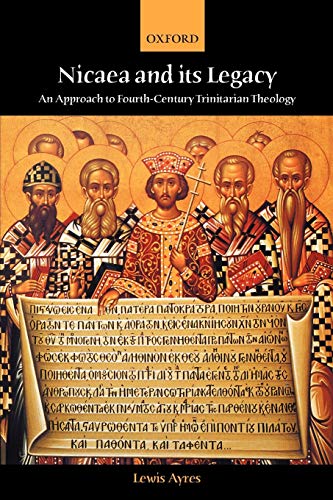Artículos relacionados a Nicaea and Its Legacy: An Approach to Fourth-Century...

Sinopsis
Lewis Ayres offers a new account of the most important century in the development of Christian belief after Christ. He shows how the doctrine of the Trinity was developed, and in particular argues that a conception of God's mysteriousness and spiritual progress towards understanding is central to that doctrine. He also proposes that modern theologies of the Trinity fail to appreciate the depth and power of Nicene trinitarianism.
"Sinopsis" puede pertenecer a otra edición de este libro.
Acerca del autor
Lewis Ayres is Assistant Professor of Historical Theology, Candler School of Theology and the Graduate Division of Religion, Emory University.
"Sobre este título" puede pertenecer a otra edición de este libro.
EUR 14,90 gastos de envío desde Alemania a España
Destinos, gastos y plazos de envíoComprar nuevo
Ver este artículoEUR 5,19 gastos de envío desde Reino Unido a España
Destinos, gastos y plazos de envíoResultados de la búsqueda para Nicaea and Its Legacy: An Approach to Fourth-Century...
Nicaea and its Legacy : An Approach to Fourth-Century Trinitarian Theology
Librería: Buchpark, Trebbin, Alemania
Condición: Gut. Zustand: Gut | Sprache: Englisch | Produktart: Bücher. Nº de ref. del artículo: 3092750/3
Cantidad disponible: 1 disponibles
Nicaea and Its Legacy: An Approach to Fourth-Century Trinitarian Theology
Librería: Ria Christie Collections, Uxbridge, Reino Unido
Condición: New. In. Nº de ref. del artículo: ria9780198755050_new
Cantidad disponible: Más de 20 disponibles
NICAEA & ITS LEGACY
Librería: Speedyhen, London, Reino Unido
Condición: NEW. Nº de ref. del artículo: NW9780198755050
Cantidad disponible: 2 disponibles
Nicaea and Its Legacy
Librería: PBShop.store UK, Fairford, GLOS, Reino Unido
PAP. Condición: New. New Book. Shipped from UK. Established seller since 2000. Nº de ref. del artículo: FU-9780198755050
Cantidad disponible: 15 disponibles
Nicaea and its Legacy
Librería: PBShop.store US, Wood Dale, IL, Estados Unidos de America
PAP. Condición: New. New Book. Shipped from UK. Established seller since 2000. Nº de ref. del artículo: FU-9780198755050
Cantidad disponible: 15 disponibles
Nicaea and its Legacy
Librería: Rarewaves.com UK, London, Reino Unido
Paperback. Condición: New. The first part of Nicaea and its Legacy offers a narrative of the fourth-century trinitarian controversy. It does not assume that the controversy begins with Arius, but with tensions among existing theological strategies. Lewis Ayres argues that, just as we cannot speak of one `Arian' theology, so we cannot speak of one `Nicene' theology either, in 325 or in 381. The second part of the book offers an account of the theological practices and assumptions within which pro-Nicene theologians assumed their short formulae and creeds were to be understood. Ayres also argues that there is no fundamental division between eastern and western trinitarian theologies at the end of the fourth century. The last section of the book challenges modern post-Hegelian trinitarian theology to engage with Nicaea more deeply. Nº de ref. del artículo: LU-9780198755050
Cantidad disponible: Más de 20 disponibles
Nicaea and its Legacy
Librería: Kennys Bookshop and Art Galleries Ltd., Galway, GY, Irlanda
Condición: New. 2006. New Ed. Paperback. Lewis Ayres offers a new account of the most important century in the development of Christian belief after Christ. He shows how the doctrine of the Trinity was developed, and in particular argues that a conception of God's mysteriousness and spiritual progress towards understanding is central to that doctrine. Num Pages: 496 pages. BIC Classification: HRCC1; HRCM. Category: (P) Professional & Vocational; (UP) Postgraduate, Research & Scholarly. Dimension: 234 x 159 x 27. Weight in Grams: 718. . . . . . Nº de ref. del artículo: V9780198755050
Cantidad disponible: 2 disponibles
Nicaea and its Legacy: An Approach to Fourth-Century Trinitarian Theology
Librería: THE SAINT BOOKSTORE, Southport, Reino Unido
Paperback / softback. Condición: New. This item is printed on demand. New copy - Usually dispatched within 5-9 working days 769. Nº de ref. del artículo: C9780198755050
Cantidad disponible: Más de 20 disponibles
Nicaea and its Legacy
Librería: Rarewaves.com USA, London, LONDO, Reino Unido
Paperback. Condición: New. The first part of Nicaea and its Legacy offers a narrative of the fourth-century trinitarian controversy. It does not assume that the controversy begins with Arius, but with tensions among existing theological strategies. Lewis Ayres argues that, just as we cannot speak of one `Arian' theology, so we cannot speak of one `Nicene' theology either, in 325 or in 381. The second part of the book offers an account of the theological practices and assumptions within which pro-Nicene theologians assumed their short formulae and creeds were to be understood. Ayres also argues that there is no fundamental division between eastern and western trinitarian theologies at the end of the fourth century. The last section of the book challenges modern post-Hegelian trinitarian theology to engage with Nicaea more deeply. Nº de ref. del artículo: LU-9780198755050
Cantidad disponible: Más de 20 disponibles
Nicaea And Its Legacy : An Approach to Fourth-century Trinitarian Theology
Librería: GreatBookPricesUK, Woodford Green, Reino Unido
Condición: New. Nº de ref. del artículo: 4087463-n
Cantidad disponible: Más de 20 disponibles

